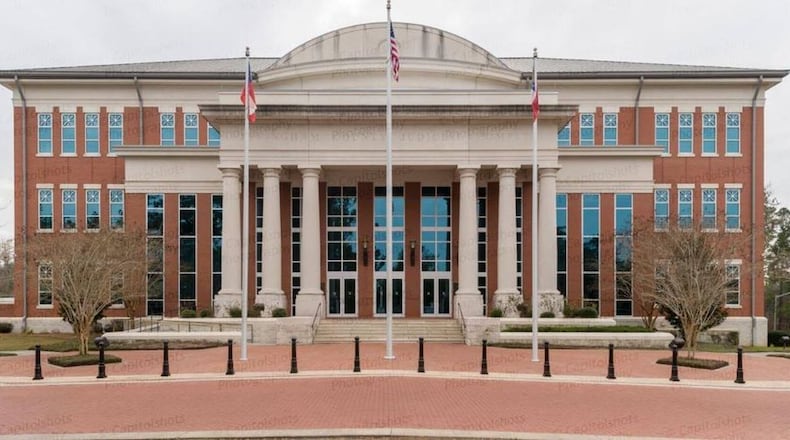The ongoing surge of COVID-19 cases across South Georgia temporarily shut down two courthouses, suspended jury trials in three more counties, and prompted an unsuccessful request to postpone an upcoming death-penalty trial.
The recent developments come on the heels of judges in Cherokee, Bibb, Glynn and Wayne counties temporarily suspending jury trials in their courthouses because of a spike in new COVID-19 cases.
In March, the Georgia Supreme Court allowed jury trials to resume after they had been suspended for almost a year. Trials in a number of courthouses are continuing to be held in some courtrooms outfitted with plexiglass barriers to prevent transmission.
This week, Chief Superior Court Judge Craig Earnest of the seven-county Pataula Judicial Circuit called a halt to scheduled jury trials in Early, Randolph and Terrell counties.
“We just felt like we didn’t have a choice,” said Earnest, whose circuit is in the southwest corner of the state where the pandemic is raging. “We’re doing all we can to keep people safe. I don’t know when we’re going to reschedule them, hopefully soon.”
Wade Padgett, head of the state Council of Superior Court Judges, said many courthouses, particularly the older ones, are ill-equipped to allow for social distancing. While some counties are arranging for jury selection and trials to be held in gymnasiums and conference centers, the acoustics in those locations can be problematic, he said.
“This is the hardest thing in the world because we’ve never experienced something like this,” said Padgett, a judge in the newly created Columbia Judicial Circuit. “Everybody is trying to do the right thing.”
If judges are encountering outbreaks in their counties, they should react accordingly and then try to get back up and running as soon as possible, he said, adding it’s important to keep in mind that most citizens are compelled to come to court.
“You want to follow the Constitution, but you don’t want to issue edicts that force people to come into a situation where they can be infected,” Padgett said.
To that end, judges in two coastal counties declared judicial emergencies last week and temporarily closed their courthouses after a number of office workers tested positive for COVID-19.
The courthouse in McIntosh County was closed all of last week to allow it to be cleaned and sanitized to prevent any further spread of the virus. It reopened Monday.
The Effingham County courthouse was closed last Friday so it could be disinfected, and it will remain closed all this week because “numerous persons” in the judicial complex tested positive, said an order signed by Chief Judge Gates Peed.
On Monday, lawyers representing defendant Donnie Rowe requested a delay of Rowe’s death-penalty trial scheduled to begin Aug. 30.
Rowe and co-defendant Ricky Dubose, who will be tried separately, are charged with killing two guards during an escape from a prison bus in 2017. Prosecutors are seeking the death penalty against both men.
Because the case generated so much publicity, jury selection will be held in Grady County in South Georgia. Jurors who are chosen will then be taken to Eatonton about 200 miles away for a weeks-long trial at the Putnam courthouse.
In their motion, Rowe’s lawyers said they have been doing everything they could to prepare for the trial. But the ongoing surge of new COVID-19 cases indicates there is a real risk of a mistrial, they said.
“Sadly, Georgians did not unite against the virus and vaccination rates remained low enough to allow the delta variant to develop and spread like wildfire,” the motion states. “Once again, Georgians find themselves facing a steep threat from COVID-19.”
Jurors will be so worried about their health and safety, they are “unlikely to focus their attention where it needs to be — the evidence, jury instructions and deliberations,” the motion states.
In previous filings, the defense team said Rowe is willing to plead guilty and receive a sentence of life in prison without the possibility of parole. And at a recent court hearing, Frank Hogue, one of Rowe’s attorneys, read into the record a statement from the family of Christopher Monica, one of the slain prison guards.
The family would like to resolve the case with a life-without-parole plea, Hogue said. They want this not out of sympathy to the defendants but because having to “relive the most horrible moments” of Monica’s life during two trials will retraumatize them, he said.
In Monday’s motion, Rowe’s defense lawyers asked that the trial either be delayed or the judge remove the death penalty as a sentencing option.
But during a pretrial hearing Wednesday, Putnam County Superior Court Judge Brenda Trammell, who is presiding over the case, said jury selection will begin on Aug. 30 as scheduled.
About the Author
Keep Reading
The Latest
Featured






